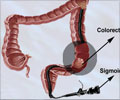Married men over age 55 years were almost 20% more likely to have had a screening colonoscopy in the previous five years than men who were not married.

‘Married men over age 55 years who are happier with the marital relationship and who have highly educated wives are more likely to have a screening colonoscopy.’





A national study involving 804 couples found that married men over age 55 years were almost 20% more likely to have had a screening colonoscopy in the previous five years than men who were not married. Men married to women who are happier with the marital relationship were nearly 30% more likely. That rises to more than 40% if their wives were highly educated. For women, however, being married, happily or otherwise, made no significant difference compared with unmarried woman. Neither the relationship happiness nor education levels of their husbands appeared to change colonoscopy rates for wives.
"Women are thought to control the health capital in most households," explained study director William Dale, chief of geriatrics & palliative medicine at the University of Chicago. "They act as health gate keepers, overseeing their husband’s health choices and directing decisions at the margins. Her decisions influence both partners."
"In contrast, women appear to derive fewer direct health benefits from marriage," he said. "We suspect they depend more on alternate support sources, such as friends and other relatives."
The study used data collected in 2010 from the National Social Life Health and Aging Project (NSHAP), a nationally-representative sample that includes older couples in the U.S. The researchers surveyed 804 male-female couples, drawn from a sample of more than 3,000 community-dwelling adults, aged 55 to 90. Average age was 72 for men and 69 for women.
Advertisement
In Illinois, according to the American Cancer Society, 1,032,400 people need to be screened to achieve 80% by 2018. Nationwide, 24 million people need to be screened to reach the goal. Staying current with screening involves either a colonoscopy once every 10 years or a yearly stool test.
Advertisement
"Screening takes time, involves preparation and recovery," Dale said. "It begins the day before, with a bowel cleansing, which means drinking a volume of polyethylene glycol, an electrolyte-rich fluid that flushes out the colon. Most people are sedated during the actual testing, and thus require a ride home afterwards. They tend to take the rest of that day off. Overall, it’s an involved process requiring assistance, especially for older adults."
"We suspect that women who are more emotionally invested in their marriage are more likely to encourage healthy behaviors in their husbands," Dale said. "Husbands are more likely to take this advice when they view their wives as supportive."
"Men don’t like to discuss cancer screening generally or colonoscopies in particular," Dale said. "They don’t tend to talk to each other about it. It is not an easy topic of conversation. But our data suggest that they will more often do it with proper encouragement and support from their spouse. Our goal now is to engage the wives, to have them in the office when we discuss cancer screening with the husband."
Source-Newswise














